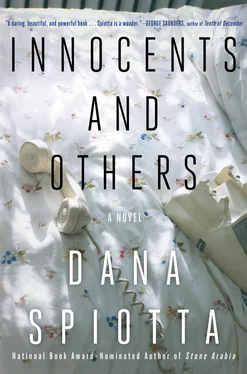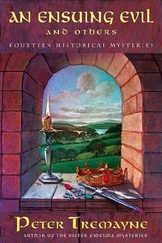Carrie had a premonition, an odd feeling, from Sarah’s flat tone. She felt a wave of nausea.
“I never told this part before. They were too busy on how the fire was set, and so I never really got to talking about it much. I crawled to the door of her room and pushed it open. I stood up in Crystalynn’s room, and there she was sleeping in her crib.”
Carrie wanted to leave the room. But she didn’t. Meadow looked frozen, listening intently. Carrie took a gulp of air and waited for what was to come.
Sarah’s eyes looked up and back as if she could see the baby. Then she looked directly at Meadow. “I saw she was sleeping. I looked down at her, and I knew that she would die if I didn’t pick her up and take her with me. It was a few seconds that I stood there. My eyes and nose were running, the smoke was getting worse and worse.” Sarah nodded. Then she stopped nodding. “But I didn’t pick her up and take her with me,” Sarah said. “I didn’t. Instead, I—”
“Cut!” Meadow said, her voice hard. Then, “Stop talking. Please don’t say anything more.” Her voice lowered to a whisper. “Jesus.” She looked at Carrie. Carrie was clutching her stomach and crying.
“I thought you wanted to hear what happened,” Sarah said.
“No, I don’t want to hear any more. I’m sorry.”
They packed up in silence. When they got into the car, Kyle drove as Meadow smoked and said nothing. After a few minutes, Meadow took the videotape out of the camera and held it in both hands. She put pressure on the plastic shell until it buckled and snapped. Carrie said nothing. Meadow turned to her left to face both Carrie in the backseat and Kyle in the driver’s seat.
“As far as I am concerned, we never heard any of that. This movie is not happening. I am done with it,” she said. “I don’t want to hear about gently placed pillows, or the caress that snapped the tiny neck, or whatever the fuck.”
“Should we talk to the lawyer?” Carrie said.
“No. As far as we know, she is a mentally ill woman making things up. And we are going to leave her alone.”
“I agree,” said Kyle. “We need to forget all about Sarah Mills. If she gets out for not committing arson, that’s fine.”
“She won’t. She doesn’t even want to get out, according to the lawyer,” Meadow said wearily. “I was hoping—” Meadow sighed. “I don’t know what.”
When they got to the train station, Carrie and Kyle got out of the car, and Meadow switched to the driver’s seat. Carrie leaned down to Meadow’s window.
“Are you going to be okay?” Carrie asked.
“Yes,” Meadow said. “I am just tired of confessions.”
“You don’t have to drive back tonight. Why don’t you stay in the city?”
“I’ll be fine. I want to get up there,” Meadow said. And Carrie watched her drive away.
* * *
Carrie remembered that it was three days before Meadow’s mother would call her and tell her about the accident.
In the 2015 spring semester, Meadow taught her class in DIY film, which always overenrolled. She attracted the students who disdained commercial filmmaking; they wanted to be like Sadie Benning, making disturbing videos with discontinued Fisher-Price PixelVision cameras they bought on eBay, or editing narratives out of found surveillance tapes, or using stop-action animation techniques for ironic nonchildish subject matter. She liked her students. They were finishing two weeks on the “LA Rebellion” of African American filmmakers of the 1970s. The anti-Blaxploitation films. Today they would discuss one of her favorite films, Killer of Sheep by Charles Burnett, which she had screened earlier in the week.
“ Killer of Sheep was Burnett’s MFA thesis. Think about that. Burnett made it for ten thousand dollars. Black-and-white sixteen millimeter shot with a school camera and edited in the school editing room. He made it on weekends over five years, using a number of nonactors from his Watts neighborhood, and filming in locations he grew up in. He says he wanted ‘just the daily life of a person.’ A scripted, fiction film that also contains a lot of real life, including the famous extended scenes of children playing. It is a beautiful film. The poverty of the neighborhood is everywhere, but Burnett treats it as something worthy of deep looking, with long takes, striking compositions, and lush music.”
Meadow paused. “Today for small amounts of money we can buy a digital camera and edit film on our laptops. Or we can shoot and edit films using our iPhones. And yet. We should be overwhelmed with amazing outsider films, indie films, handmade films. Where are they? If technology was the barrier, and that barrier is gone, why don’t we have some nerd in Albany making a homemade great American film like Killer of Sheep ? Or like John Cassavetes? Instead we get bright kids doing super cuts of TV shows or selfie/vanity films made for Vine and Instagram. Fast and shallow.”
She didn’t mind that she sounded like a scoldy old person sometimes. The students looked up to her, listened to her. One of them, she was determined, was going to make something great.
“But maybe there are brilliant homemade films being made. How would we see them, find them, with all the visual static vying for our attention? Between all the”—Meadow paused, looked very serious, very stern, waved her hand—“cat parkour videos taking up all the available channels.” The class giggled.
Afterward, as she was collecting her things, a student came up to her and waited until she looked up.
“Professor Mori, I saw your film Children of the Disappeared. I loved it.”
“Oh. Good,” Meadow said. “It was made a long time ago.”
“I read Carrie Wexler’s essay,” she said. “And your essay.” She made finger quotes when she said “essay” and smiled.
Meadow knew they would get around to asking her about that. Meadow smiled and then zipped up her bag. Meadow liked this student; she always listened and made interesting comments.
“Your essay was great — people were totally confused by it.” Then, “I didn’t realize you wrote fan fiction. And it is really cool that you did old fat Orson Welles, nobody does old fat Orson Welles. Plenty of people have done young slim Welles, but I don’t think anyone has done what you did.” The girl beamed. She appeared to be waiting. Meadow just nodded and waited back. “So, can I ask you something, Professor?”
“Sure.”
“Since you are so passionate about cinema, why would you quit making films? If you don’t mind my asking?”
“I don’t mind your asking. I just haven’t wanted to make any more films. I used to—” Meadow stopped, looked at this young woman’s face. “But not anymore.” The student nodded. “I’m afraid I have to get to a meeting now.”
“Oh, sure.” The student walked to the door and then turned to face Meadow. “You know what? I know you were joking, but there actually are cat parkour videos. It’s like a whole subgenre of cat videos.”
Meadow laughed and shrugged. “Of course!” When the student left the room, Meadow said, “Fan fiction? Oh my god.”
When she got home, Meadow opened her laptop and reread Carrie’s essay. Carrie had written that the accident had changed Meadow, which certainly was true. Of course Carrie knew more than that, and she had to leave that part out. But over the years Meadow saw the whole thing much more clearly. Your life changes, and it can seem like it bursts into the new life. A damascene moment, a conversion. But if she was honest, she saw it was a number of moments—significant events, one building on the other. All of them converting her, spinning her toward her new life. It wasn’t a downward spiral, although it felt that way at the time; it was an inward spiral, a seashell spiral, a spira mirabilis , as if she were drawing the events to her, moving her closer to who she really was.
Читать дальше












